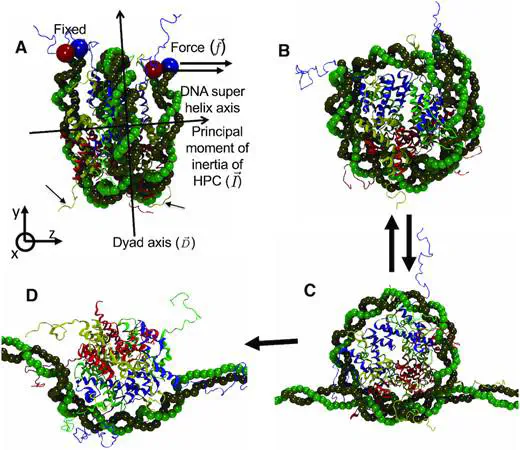Asymmetry in Histone Rotation in Forced Unwrapping and Force Quench Rewrapping in a Nucleosome
 Image credit: G. Reddy
Image credit: G. Reddy
Abstract
Single molecule pulling experiments have shown that DNA in the nucleosomes unwraps in two stages from the histone protein core (HPC). The first stage, attributed to the rupture of the outer DNA turn, occurs between 3 and 5 pNs, and is reversible. The inner DNA turn ruptures irreversibly at forces between 9 and 15 pNs (or higher) in the second stage. Molecular simulations using the Self-Organized Polymer model capture the experimental findings. The unwrapping of the outer DNA turn is independent of the pulling direction. The rupture of the DNA inner turn depends on the pulling direction and involves overcoming substantial energetic (most likely electrostatic in origin) and kinetic barriers. They arise because the mechanical force has to generate sufficient torque to rotate the HPC by 180°. On the other hand, during the rewrapping process, HPC rotation is stochastic, with force playing no role. The assembly of the outer DNA wrap upon force quench nearly coincides with the unwrapping process, confirming the reversibility of the outer turn rupture. The asymmetry in HPC rotation during unwrapping and rewrapping explains the observed hysteresis in the stretch-release cycles in experiments. We propose experiments to test the prediction that HPC rotation produces kinetic barriers in the unwrapping process.